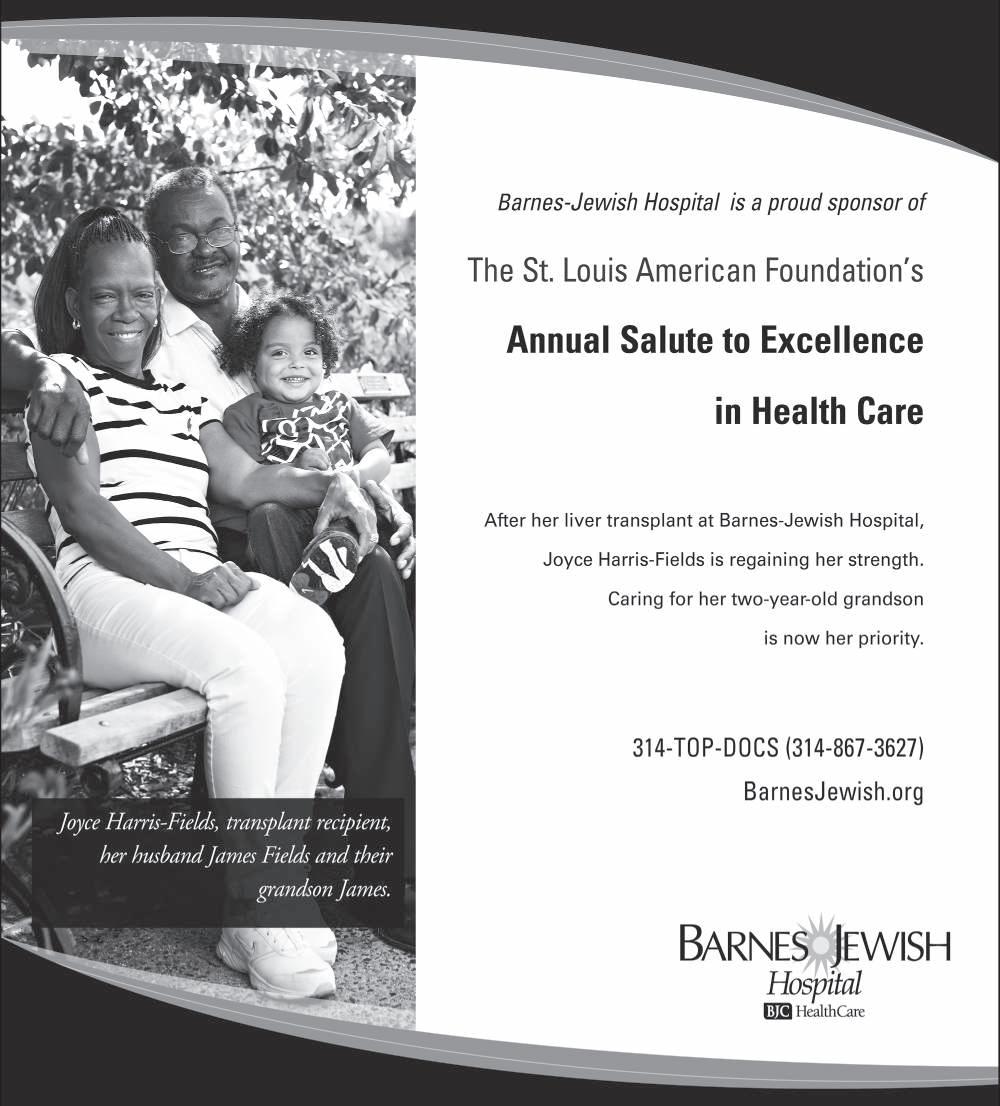




The St. Louis American Foundation shares the goal of all who seek to ensure adequate, affordable health care for all –underserved communities in particular. The Foundation will again recognize, highlight and express appreciation to some of the St. Louis region’s leading African-American health care providers who are making a difference at the 13th Annual Salute to Excellence in Health Care Awards and Recognition Luncheon on April 26. We are delighted with the continuing, broad community acceptance and support of the luncheon as part of an ongoing effort to provide relevant health education information for African Americans, as well as encourage the pursuit of the varied opportunities in the health care field.
Adetailed report released by the St. Louis Regional Health Commission highlighted the failure of our health care safety net to provide for the region’s medically underserved. In the midst of irrefutable data documenting the system’s operational inefficiencies, perennial underfunding and missed opportunities for collaboration of safety net organizations, the report also indentified an oasis of community health organizations and devoted health care providers who are striving to dismantle the systematic and nearly insurmountable barriers to health
care for the indigent and underinsured. These tremendously committed and passionate health care leaders have an unwavering devotion to the community and share the moral conviction that they cannot afford to stand idle while so many suffer from preventable illnesses.
Our 2013 Salute to Excellence in Health Care awardees share these values.
a refreshing view on how a dysfunctional health care system can be reformed. Also common among them is the belief that community-based programs will have the most profound impact on eliminating racial health disparities, They support the approach we must all take if we are sincere about providing universal access to health care.
All of the outstanding men and women in health care, represented by our awardees, understand that within our “world class”health care system, every patient should be treated with dignity and respect and deserves the highest quality of health care available.
Their productive careers exemplify what’s right with health care in St. Louis. Dreamers and selfless practitioners, they do more than offer the rhetoric of “leave no one behind.”
All of the outstanding men and women in health care, represented by our awardees, understand that within our “world class” health care system, every patient should be treated with dignity and respect and deserves the highest quality of health care available.
They inspire our youth to pursue careers in science and medicine and offer
And we are unequivocal advocates for universal, quality health care. Inspired by the positive attitudes and commitment to service of our honorees, the St. Louis American Foundation affirms that health care is indeed a fundamental right, and that good health care is best rendered in neighborhood settings by compassionate providers who know, respect and love their community.
Yet, the greatest agent for social change and a healthy community has been, and will always be, an invalued, focused revitalized African-American
The thirteenth annual
community and the more forward-thinking health care leaders who move within it.
Since the inaugural Salute to Excellence in Health Care in 2001, we at the St. Louis American Foundation are proud to have honored more than 120 outstanding African-American health care providers at this annual luncheon. We've celebrated the longstanding careers of the lifetime achievers, while lauding and highlighting the current work of the Excellence in Health Care awardees.
We're also looking towards the future and the fact that there will be a tremendous shortage of nurses in the next decade, in St. Louis and throughout our nation. We are proud of a new collaboration we began last year with the Deaconess Foundation and the Scholarship Foundation of St. Louis, that provides $100,000 worth of scholarships, per year, for local nursing students. As our caregivers of the future, their work will be essentially vital to our community, and perhaps, some day, they too will be honored at the Salute to Excellence in Health Care Awards Luncheon.
Donald M. Suggs
President St. Louis American Foundation
Presented by the St.Louis American Foundation
HONOREES:
2013 Lifetime Achiever in Health Care
Art Perry
2013 Stellar Performer in Health Care
Angela Brown
Health Care Administrator of the Year
Johnetta M. Craig, M.D., M.B.A.
Health Care Advocacy Organization of the Year Places forPeople
2013 Excellence in Health Care Awardees
Catrina W. Chambers, Ph.D.
Marsha Fisher, MD
Kenya Haney, MSN, RN
Charissee Jackson
Marc A. McNeese, RN
Jovita Oruwari, MD, FACS
Candace T. Wakefield, DMD
Judy Wilson-Griffin, MSN, RNC-OB, C-EFM
PRESENTING SPONSORS:
Centene Corporation
Home State Health Plan
PARTICIPATING SPONSORS:
Gold Sponsor
SSM Health Care
Silver Sponsor
St. Louis College of Pharmacy
Bronze Sponsor
Barnes-Jewish Hospital
By Sandra Jordan
Of The St.Louis American
Until late January, Catrina Chambers, Ph.D. served as an asthma disparities consultant for the St. Louis Regional Asthma Consortium. During her twoyear association with the group, Chambers focused on health promotion and disease prevention for the Consortium and expanded asthma networking agencies in St. Louis from four to 27 agencies in one year. Previously, she was the project director for the Asthma Management for At Risk Children, a grant for the St. Louis region.
“We looked at asthma-friendly pharmacies and talked to physicians about how to administer asthma medication,” Chambers said.
“We also had a health homes component where we put on some seminars so people can become healthy homes specialists and also teach about ways to alleviate asthma irritations in the homes and when they are out in the community.”
They also pursued a durable medical component in partnership with Asthma Friendly St. Louis.
“They provide spacers, bedding to eliminate any type of asthma or allergens
that the patient will encounter in their home,” she added.
Chambers earned a master’s of science in public health from Meharry Medical College and a bachelor of arts in biology at Fisk University, both located in Nashville, Tenn.
Last year, Chambers earned a doctorate in public policy with a concentration
Catrina W.Chambers,Ph.D.
on health policy from Saint Louis University. Her dissertation research explored the effects of smoking ordinances on asthma outcomes.
In July, the Sacramento native will again focus on asthma and tobacco prevention when she begins a fellowship in San Francisco.
“I will be doing an extension of my dissertation research, which was statewide tobacco policy,” Chambers said. “I will be looking on the return on investment for statewide tobacco policy
Seeing the effects of smoking on family members sparked her interest in asthma and smoking prevention.
for the asthma community.”
Seeing the effects of smoking on family members sparked her interest in asthma and smoking prevention. Initially, Chambers wanted to be a physician, but she realized something very important was missing in her quest in medicine.
“At first I wanted to become a doctor; however, after I finished up undergrad, I really didn’t know how to study,” she admitted with a laugh.
“That’s really a skill set that you don’t technically learn when you’re in high school, so I found out I wasn’t the best study person in undergrad.”
Chambers had a choice to make.
“I could either apply to medical school and fail, or I could get this secondary degree and really learn how to study and then still be attached to the
See CHAMBERS, page 21
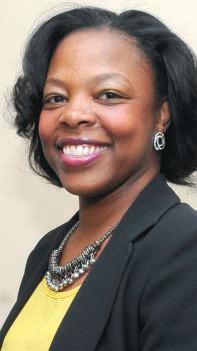
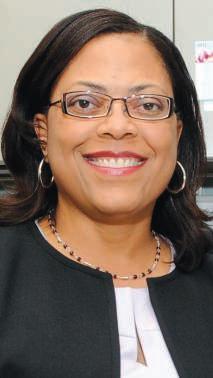
By Sandra Jordan Of The St.Louis American
Those medical school enrichment programs for high school students can really pay off in a big way for the St. Louis community.
Ask Marsha Fisher, MD. She is an obstetrician gynecologist at Mercy Clinic Women’s Health – Ladue. The chemistry and mathematics major attended one of those programs while attending Metro High School, and it opened her mind to the idea to pursue a career in medicine.
“Learning in those arenas allowed me some opportunities, both in research medicine and in clinical medicine,” Fisher said. “I was actually involved in a program in high school through Washington University.”
It introduced students to the pre-medical field, and it introduced Fisher to some amazing mentors.
“One of my biggest mentors was a research scientist, Bill Goldman at Washington University,” Fisher said. “He introduced me to research but he also introduced me to a number of people throughout the Washington University community, including clinicians, that pretty much helped mentor me along the
way.”
Before the program, Fisher saw a career filled with statistical data. By the time she became an undergraduate college student, Fisher knew she would do something in the sciences.
“I thought I was going to be an actuary, a statistician for the insurance industry,” Fisher said. “But the more I gained
Marsha Fisher,M.D.
exposure to medicine; I realized that I liked people.”
This doesn’t mean that actuaries don’t like other human beings, of course; Fisher just found her niche.
And she always knew she would, because of support from friends and family, which includes her mother, Claudia Fisher, a former St. Louis Public Schools teacher, two daughters, Torey and Maya Dunlap (who are involved in academics and athletics at her old high school), her grandmother and lots of extended family.
“Someone who’s able to take the science and the art of medicine and make it personal is what I strive to be.”
–Marsha Fisher,M.D.
She said it is probably her mother that she looks up to the most.
“She was such a fine example of a working mom: patient, a master at multitasking, organized and loving,” Fisher said. “And so I had a fine example. My parents and family always made me feel like, if you get out there and push yourself, you can do it – whatever you want to do.”
Fisher earned a Bachelor of Arts in Mathematics and Chemistry from Washington University and earned her medical degree at the University of Missouri – Columbia School of Medicine. She came back to St. Louis for her residency in obstetrics and gynecology at Barnes Hospital.
Fisher has served the health needs of
See FISHER, page 21
By Sandra Jordan Of The St.Louis American
“My dream when I decided I wanted to become a nurse was to be a midwife,” said Judy Wilson-Griffin, MSN, RNCOB, C-EFM. “Then I decided if I was going to stay in St. Louis, I wasn’t going to be unemployed because they weren’t going to hire midwives.”
Now sheis a prenatal clinical nurse specialist at SSM St. Mary’s Health Center in labor and delivery and an adjunct instructor for the School of Nursing at Saint Louis University.
For more than 30 years Wilson-Griffin has supported and facilitated care for women and newborns. Initially, she wanted to deliver babies.
“I just looked at the number of people who having problems with their pregnancies and it was just fascinating to me,” Wilson-Griffin said.
Almost as fascinating as some the excuses she heard.
“I heard people talk about ‘those people’not being compliant and that ‘they’ just didn’t get their prenatal care,’” Wilson Griffin said.
“I was like, ‘Well, really? Do we real-
ly do a good job of telling people why they need to come? And do they really have access? And do they have transportation?’And maybe if we focused on identifying why people don’t come, we would have better outcomes.”
She wanted to know if there was a
real correlation between good prenatal care and improved outcomes.
“We should really look at a better way of bringing people together and giving them good information, and then maybe they would show up,” Wilson-Griffin said.
“It was just fascinating to me that as a health care team we presumed people didn’t come because they really didn’t care, and I just didn’t buy that.”
Another area of concern is those mothers who lose their babies. She says every hospital has a program for support.
“But we don’t’have the right support in place for African Americans when they experience a loss.”
– Judy Wilson-Griffin
“We look at what kind of memories can we create for that family, because even though the baby did not survive, that is still a baby, a child that the family was looking forward to having,” WilsonGriffin said. “We create a memory book and tokens for that child.”
She concluded that meeting the needs of African Americans who have experienced such a loss is not being addressed.
“We don’t have the right mechanism in place to address that. Because people say things like, you had a loss, you can do it again,’” Wilson-Griffin said.
“But we don’t’have the right support or right support group in place for African Americans when they experience
See GRIFFIN, page 21


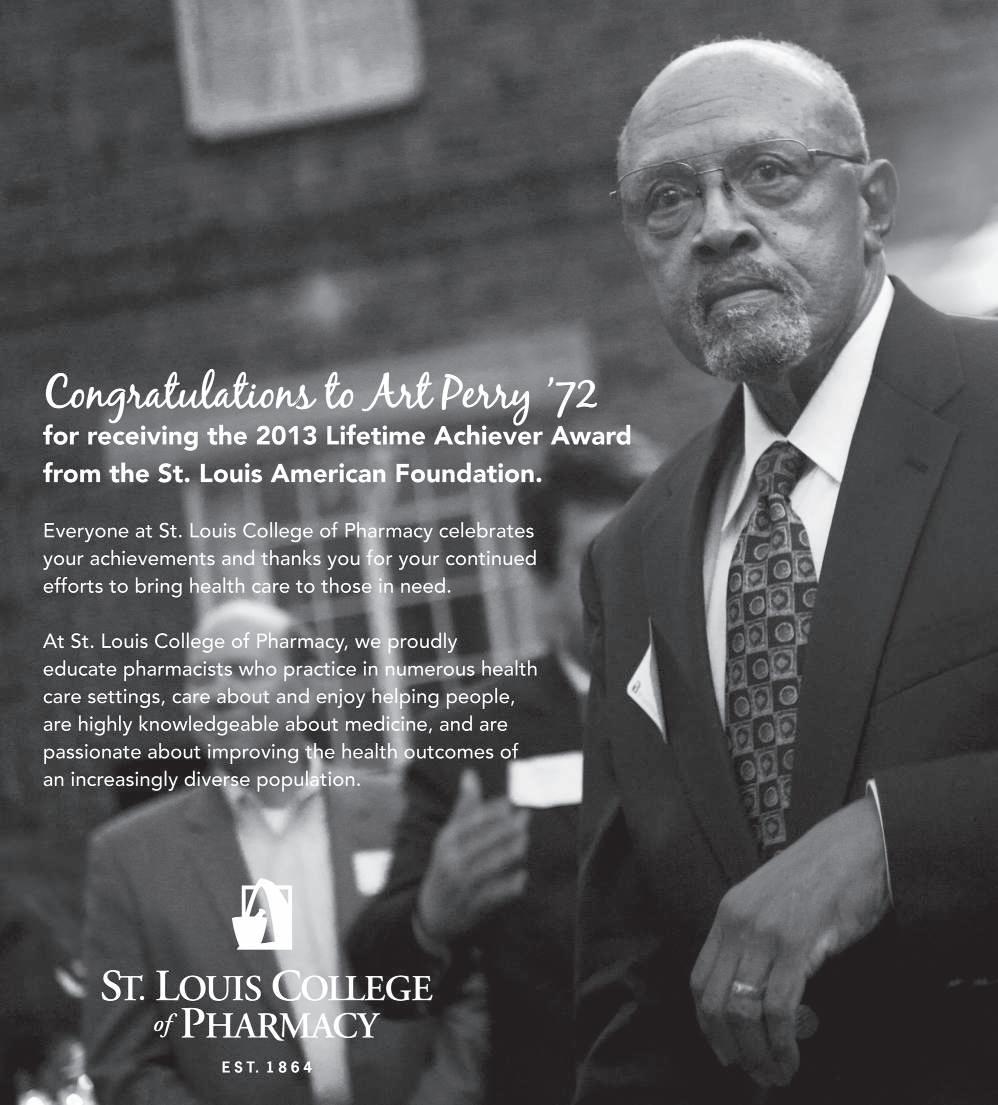
By Sandra Jordan Of The St.Louis American
Nursing is in the blood of Kenya Haney, MSN RN. She was raised by a nurse.
“I kind of always grew up with health care in my background and health care advocacy in the community, especially in St. Louis city, and its something that I’ve kind of always known I would grow up to do,” she said.
Haney is a cardiac service line manager for Barnes-Jewish St. Peters Hospital and Progress West Health Care Center in St. Charles County, Mo. Previously she worked at SSM St. Joseph’s Health Care Center, managing orthopedics and medicine.
“My heart was always in cardiology. When I got out of nursing school, I worked in the ICU and the ER at Christian Hospital,” Haney said. “You either love cardiology or you hate it –and I happen to love it.”
When she was approached with a taking on a leadership position across multiple BJC HealthCare facilities, Haney said it was something she had to do for the community.
Haney’s responsibilities include running two cardiac catheter labs, a cardiopulmonary rehab area, respiratory therapy, invasive and non-invasive cardiology, and an anticoagulation clinic.
Haney said she loves cardiology because it touches everyone.
Kenya Haney,MSN,RN
“I do not believe there is anyone out there who has not been affected by cardiology in some form, shape or fashion, whether it’s someone’s grandma who has high blood pressure, being able to save the life of a father of young children or just being able to help the grandma sustain her level of living and her quality of living with her heart,” she said.
Her love of “all things heart” is paralleled only by her love of advocating for health policy changes in the nursing profession.

“You may have a nurse practitioner who is dying to have a practice for our patients, but are not able to do so.”
– Kenya Haney,MSN,RN
“Health policy – that’s my true passion, especially when I look at minorities and underrepresented populations,” she said. “Having someone there in Jeff City or there in Washington, D.C. to advocate for our patients – that’s what I do best.”
Haney said nurses should be able to practice to the full extent of their training and licensure, which is restricted in some states, including Missouri. What is being pushed statewide by nurses is what Haney describes as barrier-free health care.
“It removes some of the restrictions that nurse practitioners have in order to
page 21

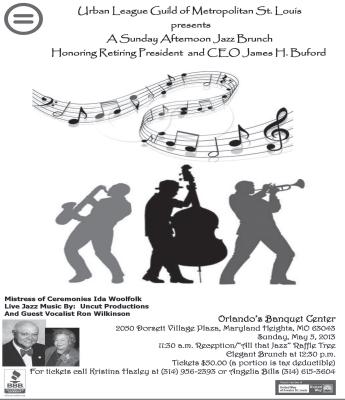
By Sandra Jordan Of The St.Louis American
After years of working in the health care and in education, Charisse Jackson found a calling that combines her area of expertise – training health professionals and the public on how to be more accepting of people who may look, live and behave differently from one another.
For the last 14 years, Jackson has been conducting diversity and cultural competency training. Jackson was involved in anti-oppression training at Barnes-Jewish Hospital through previous work at the National Conference of Community and Justice of Metro St. Louis, known as NCCJ.
“I was part of the initial design of the training that we did for their Diversity Council, for their senior management team, and at that point, I realized that there was such a need for this kind of work in health care,” Jackson said.
“Everybody doesn’t have health care as a diversity issue. It’s about class and who can afford it, and the more money you have, the better care you get. All those sorts of things start to play into people’s quality of care.”
For the last five years, Jackson’s cultural competency mission has played out at Planned Parenthood of the St. Louis Region and Southwest Missouri, where she served as vice president of education and diversity.
Her work included the award-winning medically-accurate, age-appropriate,
Charisse Jackson
comprehensive sex education programs
Peer-to-Peer Education and Boys2Men. Jackson’s department also led presentations on sexual health, sexuality and healthy relationships – all in order to decrease the rates of unintended pregnancies and sexually transmitted infections. These included Real Life, Real Talk for parents, guardians, and caregivers and Teen Advocates for Sexual Health.
Jackson relocated to Atlanta in late March, after spending 23 years in St.
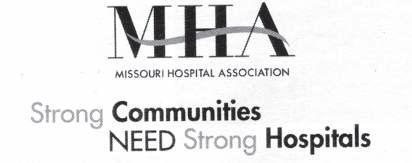
P.O. Box 60 ï Jefferson City, MO 65102-0060 Phone: 573/893-3700 ï www.mhanet.com
“I will never stop doing diversity work.No matter what job I have, diversity work is a part of it.”
– Charisse Jackson
Louis. She is a Macon, Georgia native who graduated from Spelman College with a Bachelor of Science in biology. She earned a degree in medical technology from Meharry Medical College in Nashville, Tenn.
She worked as a medical technologist at Meharry before moving to Topeka, Kansas where she worked as an MTin an independent laboratory in and the Veteran’s Administration Hospital before moving to St. Louis.
Here, she enrolled in Harris-Stowe State University’s education program and later became a teacher at Crossroads Preparatory School, where she taught Earth and Environmental Science and
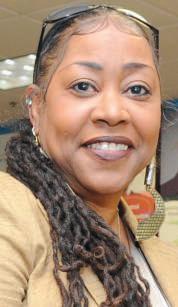

By Sandra Jordan Of The St.Louis American
An embarrassing moment in the operating room led to the creation of a device that is now used in hospitals throughout the U.S. and in other countries.
It’s called a “The Finale,” a radial medical compression device designed to make procedures in operating rooms more effective and efficient. It was invented by Marc A. McNeese, RN, a disaster preparation and event manager at Saint Louis University Hospital.
With his invention, cardiac catherization is able to go through the wrist rather than the groin, which had been standard.
After conducting a cardiac catherization through the transradial artery of the wrist, McNeese said, something was needed to automatically apply pressure on the artery after the procedure was done.
“One day, there was about three of us who were trying to gain radial compression on a vessel that had gone wild; bleeding was just all over the place,” McNeese recalled, saying it was because of a blood thinner the patient was taking
to prevent clotting. The surgeon was not pleased.
“He came over and asked how many blankety-blankety-blanks does it take to get control of a bleeding artery,” McNeese said.
He laughs about it now, but it was not
Marc A.McNeese,RN
at all funny at the time.
“It was so embarrassing that I went home and I was just so set aback by it,” he said. “He made his concerns known to the point that I would never ever let myself be put in that situation again. Ever, ever.”
He was embarrassed enough to realize a stroke of genius.
“I was just lying in bed, and I had my hands behind my head and my watch was bothering me because I couldn’t get a comfortable feeling behind my head,”

“I navigate in and out of different departments and see those things I need to see to make those things less challenging to do.”
– Marc A.McNeese,RN
he said.
“And I looked down at my wrist and I said, ‘Hey, I wear my watch like this all the time, so why couldn’t I come up with some type of way that I could use this same concept and create a dialing type of effect that could put pressure on the radial artery?’”
With his brother Louis McNeese being a machinist, McNeese put together a couple of sketches and created a rough prototype. With that same doctor providing feedback, over a span of a few months they used the working prototype to develop the patented and marketed
See McNEESE, page 22


By Sandra Jordan Of The St.Louis American
The icy, cold stereotypical image of surgeons, with scalpel in hand, interested only in cutting on people is a misnomer that Jovita Oruwari, MD, FACS works to assuage each day through her work as a surgical oncologist.
“As you know, surgeons in general don’t have good reputations – it’s all about cutting and leaving and moving on to the next patient,” Oruwari said.
“But as a breast cancer surgeon, you have got to get to know your patients, from day one and you get to stay with them as they go through the rest of their treatment and through all the trials and tribulations. I truly enjoyed that – getting to see them triumph over the breast cancer.”
During her training in general surgery in New Jersey, Oruwari encountered women with breast cancer. The experience compelled her medical vocation.
“I was fortunate to intern under a female breast surgeon whose work was just quite amazing to me,” Oruwari said. “The way that she treated her patients, her level of concern, her level of care is what really enamored me to this particular specialty.”
Oruwari is a partner at the Mercy Clinic St. Louis Cancer and Breast Institute in Ballwin, Mo. As a breast surgeon, Oruwari specializes in a spectrum of breast health issues, from pain, rashes, benign lumps, nipple discharges to cancers.
“I treat all breast problems, and about
30 percent of it happens to be breast cancer,” Oruwari said.
She’s been in practice since 2001.
“Alot more women are going into surgery and that’s a great thing,” she said. “Women bring into the practice of surgery a lot of humanity, a lot of emotion. Not to say that the men don’t do the same, but a lot of what you used to watch on TVgrowing up has changed.”
Oruwari said preventative breast health is very important, not only for cosmetic reasons but also for health reasons.
“Women need, from a young age, to
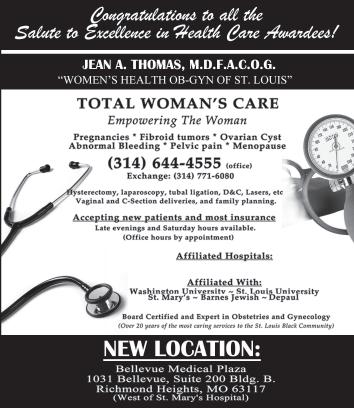
“I truly enjoyed that – getting to see them triumph over the breast cancer.”
–Jovita Oruwari,MD,FACS
be aware of changes breasts can go through,” she said. “It’s a matter of learning your breasts and knowing enough to know when normal changes become abnormal.”
Breasts can get bigger or smaller depending on the stages of a woman’s menstrual cycle, aging and menopause, Oruwari explained. During menopause, fibrous glands are replaced by fatty tissue and breasts will naturally start to distend, she added. Even breast pain at certain times is not uncommon.
“It doesn’t necessarily mean it’s something bad, but it means it’s something that definitely needs to be looked at,” she said.
She often speaks to community groups, churches and schools about breast health.
See ORUWARI, page 22

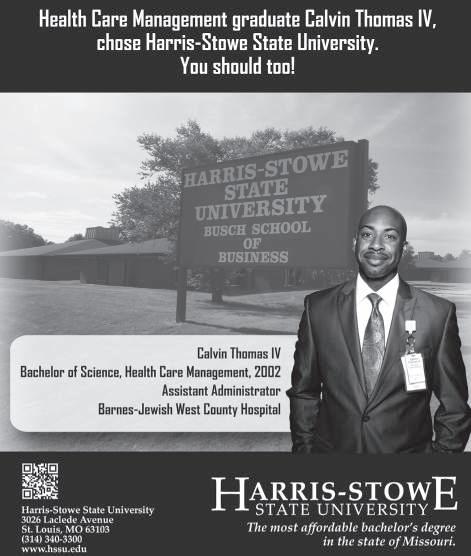
By Sandra Jordan Of The St.Louis American
Most people don’t think of having a blast at the dentist’s office, but that’s exactly the atmosphere that Candace T. Wakefield, DMD goes for at the Children’s Dental Zone in Florissant, Mo.
The pediatric dentist designed her practice to be kid-friendly, with highenergy music jamming and all the electronic gadgets and games a youngster could ask for. She thinks of the office as the “Chuck E. Cheese” of dentistry, where it’s always party time.
“Everything is for the child,” Wakefield said. “We have iPads on the walls. They can come in and get stimulated heavily by all the video games we have on display. We also have a nice fish tank is there and all those little, little kids like to go run and see that, because it’s a pretty nice-sized fish tank.”
The underwater theme continues with a SpongeBob SquarePants bathroom and other colorfully-themed rooms. The office also plays “very energetic, highintensity music” she mixes herself.
“It’s almost like a party, and that’s kind of the atmosphere we want to cre-
ate,” Wakefield said.
Wakefield realizes it may be a bit quirky for some, but it’s all a result of growing up in a very large family with lots of kids.
“I get along well with kids. That’s why I chose pediatric dentistry over general dentistry, because I feel as though
Candace T.Wakefield,DMD
kids can relate to me and I’m able to relate to their needs,” Wakefield said.
“They don’t view me as some old doctor. It’s because of my silly personality; I was the class clown in high school and I like to have fun and I like to bring that to the office.”
In 2011, Wakefield authored her first book for children, which is available online. “I wrote my first book, My Dentist Appointment to lessen the fears some children may have about their first dental appointment,” she said.
For adults, Wakefield has a separate
“It’s almost like a party, and that’s kind of the atmosphere we want to create.”
– Candace T.Wakefield,DMD
dental practice across the hall, the W Dental Group.
The St. Louis native is a 1991 Riverview Gardens High School graduate. She credits a particular teacher, Vera Raglin, for early inspiration.
“She was my honors English teacher two years in a row and she really helped to mature my mind and to cultivate my mind,” Wakefield said. “She helped me to be a more mature student and to push myself further than just getting the grade.”
Wakefield’s mother is a retired East St. Louis Lincoln High School teacher, and her father retired from Ford Motor Company. Although there are MDs and PhDs in the family, she is the first dentist. Her St. Louis mentor in pediatric
See WAKEFIELD, page 22

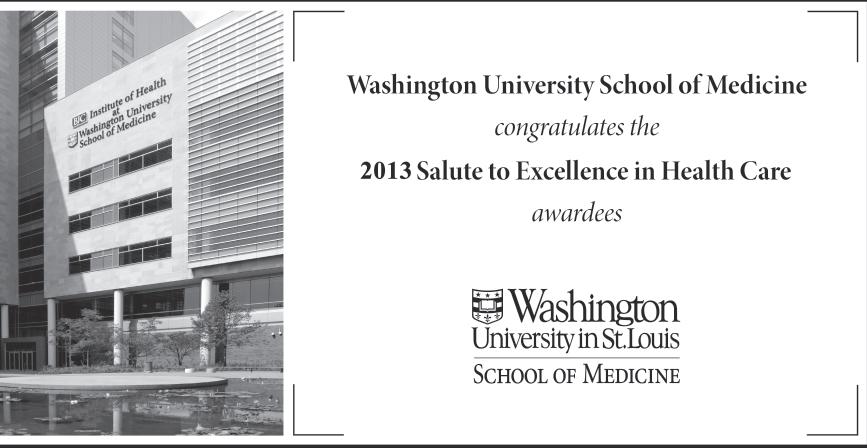


By Bridjes O’Neil Of The St.Louis American
“I have a passion for helping people, especially underserved people who look like me,” said Angela Brown, director of operations at the St. Louis Regional Health Commission. “And, health care has been the avenue to fulfill this passion.”
Almost six years ago, Brown began working for the St. Louis Regional Health Commission, a nonprofit organization created to improve access to health care and reduce health disparities in St. Louis City and County.
“I have a passion for helping people, especially underserved people who look like me.”
– Angela Brown, St.Louis
Regional Health Commission
Brown is receiving the 2013 Stellar Performer in Health Care award at the St. Louis American Foundation’s Salute to Excellence in Health Care Awards Luncheon. Brown was instrumental in the development and implementation of Gateway to Health, a $30 million a year program that ensures access to health care for uninsured people throughout the St. Louis region. Part of her job includes designing outreach initiatives.
“Through my current work on Gateway to Better Health, we cover primary and specialty care services for over 20,000 individuals,” she said. “Of the 20,000 people we serve, 80 percent are African Americans.”
She also tracks program outcomes, frequently asking for feedback from patients and providers and incorporating that information into long-term goals to improve the program.
Working on the commission’s health initiatives, her extensive research background comes in handy. After graduating from SLU in May 2005, she worked as a research associate at Open Health, LLC and Transtria, LLC (both formerly part of Inneval, Inc.) At Open Health, she assisted on an asthma resource inventory project to identify asthma programs in Missouri. At Transtria, she researched and abstracted data from tobacco, nutrition and diabetes behavioral change interventions for Intervention Missouri Information for Community Assessment.
As part of the commission’s behav-
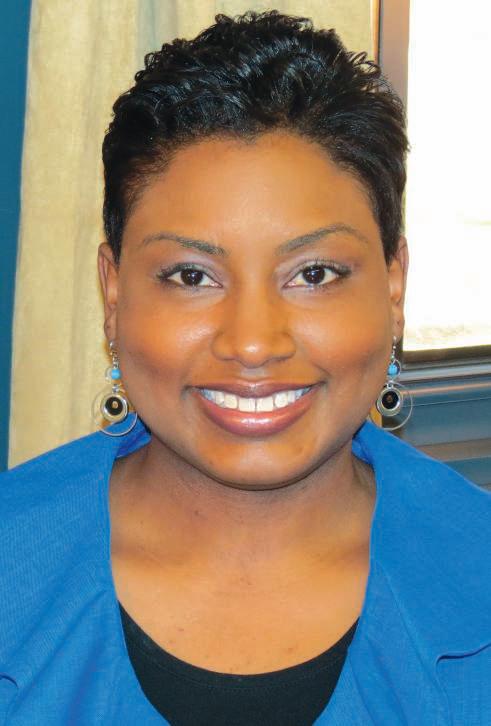
She also led the St. Louis Community University Health Research Partnerships initiative. Its goal was to identify innovative models of care that could potentially improve community health and foster long-term relationships between academic researchers and community organizations.
“Through this $1.5 million initiative we were able to fund seven community and academic partnerships that have had a tremendous impact in the community in the areas of breast cancer, diabetes, injury prevention, nutrition, substance abuse and maternal and child health,” she said.
Brown always thought she would become a nurse.
“My very first job was in a nurse’s station taking prescription refills,” she said. “Through that experience I was able to see the impact nurses had on people’s lives every day, and that was what I wanted to do.”
Her mother is a social worker in the mental health field, and her aunt is a nurse.
“Health care is in my blood,” she said. These early influences laid the foundation for her future career in the health care field. Yet, she struggled to find her niche. She enrolled at Stillman College, a historically black college in Tuscaloosa, Ala., where she obtained a Bachelor of Science degree in biology. And, it was during this time that she set her career sights on becoming a physician, after a brief introduction to public health.
Originally from Mississippi, she was intrigued by public health’s correlation between cultural, social and environmental factors and its impact on a person’s health and behavior.
“Coming from Mississippi, which is known as the obesity capital in the health care world, and a family with a history of diabetes, heart issues, high cholesterol, addiction and cancer,” she said, “these public health concepts resonated with me.”
She traveled north to St. Louis after enrolling at Saint Louis University’s School of Medicine, where she earned her masters in public health with a concentration in behavioral science and health education.
She offered insight on where she believes the commission is heading in the future.
ioral health initiative, she developed a blueprint for accessible, quality and integrated behavioral health services for the region. Through this work, she said the commission was able to identify the
region’s highest utilizers of behavioral health services – African-American males. The commission then worked with the men to develop individualized treatment plans.
“We are following the Affordable Care Act and its implications in Missouri,” she said. “This legislation significantly impacts the future direction of our organization.”
By Bridjes O’Neil
Of The St.Louis American
Everyone should have access to quality and affordable primary health care services, says Johnetta M. Craig, MD, MBA, a board-certified family medicine physician and chief medical officer at Family Care Health Centers.
Acommunity-based Federally Qualified Health Center, Family Care has two locations (Carondelet and Forest Park Southeast) in St. Louis city. As a member of the administrative staff, Craig works directly with the executive team and is responsible for the overall operation of the organization. She has been on staff at Family Care Health Centers since 2002.
“What’s so rare is having a practicing physician who sees patients and is also a very strong administrator and business leader.”
– Family Care Health Centers
CEO Robert Massie
Craig is receiving the 2013 Health Care Administrator of the Year award at the St. Louis American Foundation’s Salute to Excellence in Health Care Awards Luncheon.
Craig’s extensive background in both medicine and business has been an invaluable asset at Family Care Health Centers, says CEO Robert Massie.
“What’s so rare is having a practicing physician who sees patients and is also a very strong administrator and business leader,” Massie said. “She encourages the organization to not only grow by adding more physicians and medical providers, but to grow the other services that we have.”
Thanks in part to Craig’s efforts, Massie said, the center now houses medical, dental, vision, behavioral health, nutrition, WIC, laboratory, and HIV/AIDS counseling and testing services under one roof for maximum accessibility and collaboration of care.
“My commitment and mission have always been to the medically indigent,” Craig said.
By this she means people who come

Johnetta M.Craig,MD,MBA,is the St.Louis American Foundation’s 2013 Health Care Administrator of the Year.
from lower socio-economic backgrounds and are often uninsured or rely on public insurance plans like Medicaid and
Medicare. At Family Care Health Centers, uninsured patients are served on a sliding fee based on income and family
size. Medication discounts are available for all eligible patients.
“No one is denied access because of their financial or social circumstance,” Craig said. “We are here when no one else is.”
Educational outreach is also a top priority at Family Care Health Centers.
“We do our best to try and make sure our patients understand their medical conditions,” Craig said. “And if they don’t have chronic medical problems, that they understand the benefits and reasons for preventative medicine, like immunizations and screening tests –things that will increase their chances of living a long and healthy life.”
Family Care Health Centers partners with a number of educational organizations in St. Louis County and city that have an investment in the community like the Maternal and Child Health Foundation, food banks and the YMCA. Her favorite TVshow inspired her to specialize in family medicine. Marcus Welby, M.D. was a medical drama that aired during the late 1960s to mid-‘70s about a middle-aged general practitioner. She admired his unselfish investment in his patients and the community.
“My vision was to create a Marcus Welby-type situation for poor people because I felt that they were just as deserving of a physician who was invested in them and would advocate for them when they couldn’t.”
She had another model of medical service right in her neighborhood, pharmacist Art Perry, the 2013 Lifetime Achiever. Craig grew up in the Central West End on the same block as Perry and his family. As a self-proclaimed bookworm, she spent many weekends at home and often babysat Perry’s children.
Craig went to undergrad at University of Missouri-Kansas City and earned her M.D. at the University of Iowa Medical School. She completed her residency at St. Peters Medical Center in New Jersey. She obtained her M.B.A. from the prestigious Wharton School of Business at the University Pennsylvania. She previously worked at free community health clinics and centers in Dayton, Ohio and Wilmington, Del.
“We treat our patients as part of our family,” Craig said of Family Care Health Centers. “We are family medicine-based. You take care of your patient from the womb to the grave.”
By Bridjes O’Neil
Of The St.Louis American
“Places for People is a communitybased specialty behavioral health care organization,” said Joe Yancey, executive director of Places for People. “We provide specialized behavioral health care treatment to those in our community who are most in need.”
Over 60 percent of those served at Places for People are African-American, according to Yancey, who has more than 30 years of experience working in the mental health field, including 15 years with the Missouri Department of Mental Health.
Places for People is receiving the 2013 Health Advocacy Organization of the Year award at the St. Louis American Foundation’s Salute to Excellence in Health Care Awards Luncheon.
The private, nonprofit organization has served the St. Louis community since 1972 and is located at 4130 Lindell Blvd.
Yancey says people most in need of services are those diagnosed with HIV who have co-occurring addiction disorders and serious mental illness with complex treatment needs. Others include the homeless, refugees of torture, and at-risk youth with behavioral issues caught up in the criminal and juvenile justice system.
Yancey believes the stigma surrounding these types of disorders are discouraging to people who are too ill and mistrustful to seek help.
This was the case with Robert Wallace, a Places for People volunteer, who says he was never one to talk openly about his problems. He first came to Places for People nearly eight years ago after a referral from his physician, who encouraged him to seek counseling.
“I was in a pretty bad place when I came here,” Wallace said. “Right now, I feel as though I’m in a better place. I can see the light at the end of the tunnel. I know what my purpose is.”
His purpose, he says, is helping people who are in similar situations.
“I don’t have the money to donate to Places for People, but I donate my time as much as I can,” Wallace said.
Sandra M. Moore, president of Urban Strategies, is personally and professionally involved with Places for People.
“My oldest child has some issues that really needed significant support beyond what his father and I could give,” Moore said. “And we just found the program as a place that really seemed to focus on

taking people with mental, emotional, trauma or social adjustment issues and helping them get on a pathway of independence.”
Moore says her son, who can’t be named due to patient privacy concerns, has enjoyed having a team of counselors to assist with employment and educational pursuits as well as financial planning and budgeting.
Moore said. “They have vulnerable households in them with sometimes every member of the family needing some level of support. Places for People has come into our communities. They meet people where they are.”
“I was in a pretty bad place when I came here. Right now, I feel as though I’m in a better place.”
– Robert Wallace,on Places for People
“It’s helped him to plan, set goals and to move toward those goals,” Moore said.
Urban Strategies’mission is to empower residents in distressed urban neighborhoods to lead healthy, prosperous lives in thriving, self-sustaining communities.
“We work in communities that are experiencing some level of distress,”
The large majority of residents within these communities, Moore says, are people of color who are reluctant to seek help for mental, emotional and social issues.
“We have our eyes and ears out there in the community,” Yancey said. “Oftentimes we will get phone calls from the community that say, ‘I’ve seen this guy and seems like he could really use some help.’”
From there, Places for People attempts to establish functional relationships with individuals to assess their
needs.
“We ask, ‘Do you need a place to live, food, clothes?’” Yancey said. “Over the course of time, through that relationship, we start to engage people in services for their mental health and/or addiction disorders.”
Places for People offers individual, group and family therapy sessions that utilize evidence-based practices. The staff of more than 200 consists of social workers, substance abuse counselors, registered nurses, psychologists, psychiatrists, occupational therapists and vocational specialists. Places for People is licensed and certified by the Missouri Department of Mental Health.
“In our community, as in most communities, the need for these kinds of services far outweigh what is available,” Yancey said. “Our impact on the St. Louis community is being able to address the needs of those that will not voluntarily show up on their own for services.”
By Bridjes O’Neil
Of The St.Louis American
“Pharmacists are an integral part of all of health care,” said Art Perry, a retired pharmacist who began his pharmaceutical career at 14.
The year was 1952. He was working at Sun Drug Stores, delivering prescriptions, pain pills, over-the-counter items, sodas and alcoholic drinks to customers in St. Louis city.
Now, more than 60 years later, Perry is receiving the 2013 Lifetime Achiever award at the St. Louis American Foundation’s Salute to Excellence in Health Care Awards Luncheon.
“Students, faculty and staff need to get some experience in caring for people unlike them.”
– Art Perry
It was his stepmother, Francis Barnes-Perry, who told him he had to get a job when he asked her for a new bike. Her response was encrypted with a lifelong lesson he would never forget. She said nothing is free and anything worth having he would have to work hard for it.
During his time at Sun Drug Stores, he met Bernard and David Kean who two years later opened their own drugstore, Kean Drug, luring Perry away in the process. Perry was brought on as a sales clerk in 1954.
It was one year before Rosa Parks refused to give up her seat to a white man on a Montgomery Bus, the catalyst for the Montgomery Bus boycott against racial segregation. Hundreds of miles away, the racial climate in St. Louis was very much the same.
Kean Drug, then located at Euclid and Laclede, was in close proximity to Barnes-Jewish Hospital, where black and white patients were seen in segregated
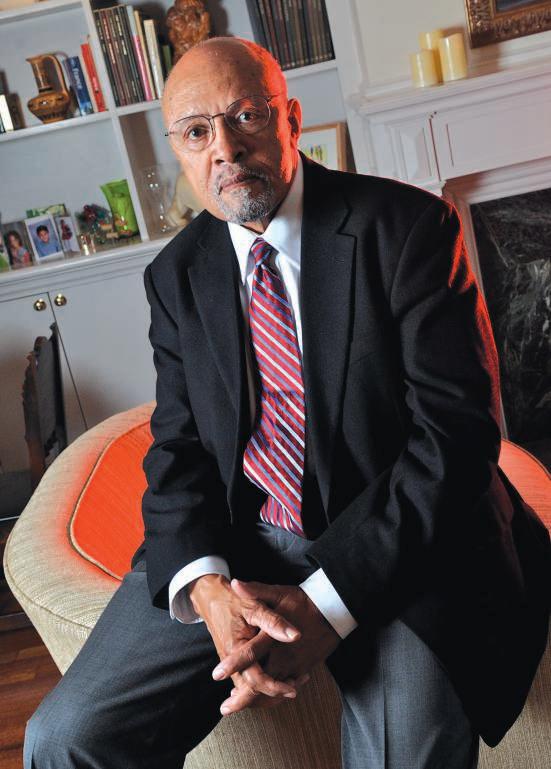
quarters.
According to Perry, Kean Drug didn’t wait for the Civil Rights Act of 1964, a bill designating segregated public spaces as unconstitutional. The Kean brothers proudly served all customers regardless of race because they too had been unfairly persecuted.
“These two guys, being Jewish, were
aware of their being Jewish,” Perry said.
“Jews were not accepted everywhere. They were not of the mind to be discriminators.”
On a few occasions, some local toughs were antagonistic toward Perry in those early years at Kean Drug.
“Sometimes after work they wanted to chase me home, but I wouldn’t allow it,”
Art Perry,a retired pharmacist,is the St. Louis American Foundation’s 2013 Lifetime Achiever in Health Care.
he said.
At Kean Drug, Perry progressed to managerial and pharmacist positions within a 27-year time span. He said his time with the company was both educational and rewarding. One of the Kean brothers, David, speaks highly of Perry.
See PERRY, page 19
Continued from page 18
His brother Bernard Kean is deceased.
“He’s a perfect gentleman. He’s an excellent employee, but a great friend also,” David Kean said of Perry. “I predicted that he would be Mayor of St. Louis, but he didn’t do that.”
In fact, Perry became the first person in his family to attend college after meeting and taking sound advice from Frank Kleffner, former president of the Central Institute for the Deaf and a Kean Drug customer.
“You’re too smart to spend all your time here; you need to go to college,” Kleffner said to Perry.
Perry enrolled at Saint Louis University, where he majored in political science while he took elective courses in science. In his junior year he was approached by Father Jansen, then a Jesuit priest at SLU, who goaded him to make a decision about his future. Perry asked Jansen whether he thought he could support a family with a political science degree.
Jansen discouraged him. Perry transferred to the St. Louis College of Pharmacy, where he earned a B.S. in Chemistry. He graduated in 1972 as a registered pharmacist, one of only three African Americans in his class. He served on the College of Pharmacy Board of Trustees and currently serves on the school’s Diversity Committee. His goal is to move the college toward being more active in its health outreach.
“I’m trying to get the college to make sure that the college has personnel in clinics around the metro area so that students, faculty and staff get some experience in caring for people unlike them,” Perry said.
Perry has been active in city politics for much of his life. Currently he is president of the 28th Ward Democratic Organization.
He also has served on the Confluence, 100 Black Men and Forest Park Forever boards. Perry has been an active member of the Mortar and Pestle Society for more than 10 years and was a Peoples Clinic Organizer.
Perry retired from Eli Lilly & Company in 2000 after 19 years of service.
“He deserves any kind of achievement award you can give him,” David Kean said. “I’m very proud to see him get this.”
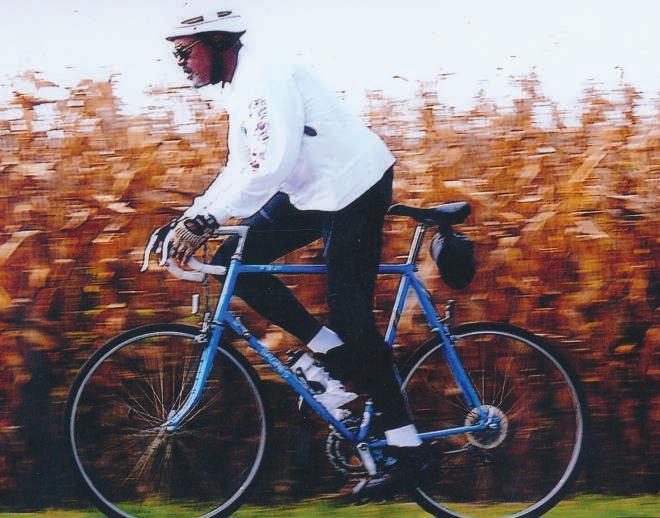



Continued from page 5
a loss. We haven’t tapped into that yet.”
Wilson-Griffin co-chairs a program called FIMR, the Fetal Infant Mortality Review Project, which examines fetal infant deaths in St. Louis County and city to see if there are any identifiable community issues factoring into the occurrences. FIMR identified one problem that was addressed through the educational intervention “Back to Sleep” which promotes babies sleeping on their backs.
“There wasn’t a program in place to say to daycare workers and to other family members about ‘Back to Sleep,’” Wilson-Griffin said. Now they’ve had one for about 10 years, she said.
Prior to joining St. Mary’s six years ago, Wilson-Griffin worked for 26 years at Barnes-Jewish Hospital, as a prenatal clinical nurse specialist, a maternal transport coordinator, assistant head nurse and staff nursing positions in labor and delivery and the newborn nursery.
Wilson-Griffin grew up in St. Louis and graduated from Sumner High School. She earned an associate’s degree in nursing from St. Louis Community College at Forest Park and a bachelor of science in nursing as well as a masters of science in nursing at Saint Louis University.
Wilson-Griffin is retired from the U.S. Navy Reserve Nurse Corp and served a few months as a staff nurse in a 500-bed
Continued from page 4
St. Louis-area women for the last 17 years, attending to gynecological issues, surgery, delivering babies and promoting disease prevention and wellness.
She said OBGYNs who are welltrained are good listeners and can take your personal health history to individu-
Continued from page 4
medical school that I would want to go to, which was Meharry,” Chambers said. “So when I advanced to the master’s program, I found out I really liked policy. How do you determine to provide service? How do you create the protocol for that? That part just really stood out to me more so than the redundancy of seeing patients every day.”
combat zone field hospital in 1991 during the conflict in the Persian Gulf. Wilson-Griffin said military service is just one of the many experiences that nursing has opened up for her.
“I love my job, and nursing for me has afforded opportunities I could have never imagined,” she said. “It just gives you such a way to connect with people that I don’t think you get in other jobs.”
Wilson-Griffin is active in community health efforts, working with churches to perform screenings for diabetes, cholesterol, hypertension and HIV. She serves in the health ministry at Christ Southern Mission Baptist Church and guest lectures in middle and high schools about sexually transmitted diseases, teen pregnancy and teen development.
She is a board member of the maternal Child and Family Health Coalition and previously served on the board of RESPOND, a child advocacy and recruitment agency for adoptive and foster care families.
Nursing crosses all barriers and all disciplines, Wilson-Griffin said, and seeing people in good times and bad times has taught her a lot. She tells her students that being clinically proficient won’t get them far by itself.
“Anybody can be good technically,” she said “but without compassion, there is always going to be something missing.”
Continued from page 7
practice at the fullest extent of their licensure,” Haney said. “There are several states that allow nurse practitioners to practice without the stringent oversight that we have here in Missouri.”
Haney said especially in the African-American community in North St. Louis City, there is often not a hospital readily available.
“You may have a nurse practitioner who is dying to have a practice for our patients, but are not able to do so because he or she may not be able to get a physician to have that particular oversight of her,” Haney described.
Haney works closely with the National Black Nurses Association and the Missouri Nurses Association, advocating to address access to health care disparities in urban and rural areas by allowing advanced nurse practitioners to help fill the void in preventive health and in primary care.
“Our nurse practitioners can diagnose, they can treat; they primarily work on preventative maintenance and health,” Haney said.
“If you are going in for a routine, adult physical or a well-woman exam, a nurse practitioner can do
pretty much anything that your physician can do. But when it comes to very particular procedural things, surgeries and things of that nature, of course, your physician would have to do it.”
Haney said nurse practitioners can give broad care in close contact with physicians.
“If you’ve got patients who cannot get in to see a physician and they can get in to see a nurse practitioner, who can help them with diagnosis and treat them and give them their medications – especially with things like blood pressure issues that really affect the African-American community – it’s really a beautiful thing to be able to have that advocate there and that liaison to help our physicians,” she said.
Haney, a St. Louis native and Parkway West High School graduate, earned an associate’s degree in nursing at St. Louis Community College and a bachelor of science in nursing from University of Missouri – St. Louis. Haney recently completed a master of science in nursing and health systems management from the University of Virginia in Charlottesville and was accepted into the University of Virginia’s doctorate of Nursing Practice program.
Haney has two children, Rico and Shayla Haney, and she is a member of St. Angela Merici Catholic Church in Florissant.
alize your care based on that information.
“What we learn in textbooks, what we learn online, what we learn in courses never completely translates into the best way to take care of patients,” Fisher said. “I think someone who’s able to take the science and the art of medicine and make it personal is what I strive to be and what I would even look for in a physician.”
Fisher said other important qualities patients are looking for include finding someone is enthusiastic, has a positive
From that, Chambers learned how to study and discovered another interest in public health.
In St. Louis, her community activities included involvement with the Grace Hill Head Start Policy Council, the American Lung Association (ALA) where in 2011, Chambers served as the Diversity Chair for the Plains Gulf Regions and worked on the ALALeadership Policy Council. Chambers also served on the boards of the Urban League Young Professionals of Metropolitan St. Louis and the St. Louis Professionals for Healthcare
outlook on life and enjoys what they do. She said she feels lucky to be a part of the St. Louis community.
“I grew up here and there have been many blessings because of that, and my practice has grown tremendously because of it,” Fisher said. “When people know you and respect you, I think it’s very easy to grow.”
The Salute to Excellence in Health Care Awardee needs only to look around for her purpose-driven life.
Quality.
In 2011, Chambers was inducted into the Delta Omega Public Health Honor Society at Meharry Medical College. Last year, the National Sales Network recognized her as one of the most influential black women in St. Louis. Chambers’next efforts begin in July at the Center for Tobacco Control Research and Education at the University of California San Francisco. It’s much closer to home, although there is no promise that she will stay there.
“I really love the D.C. area, but my
“My motivation is what I do every day: taking care of patients and helping them make their lives better and raising their families,” she said. “And practicing long enough to grow old with some of my patients has been one of the most rewarding things. And having them give me some kind of idea of how much influence I’ve had on their health and their well-being is the most rewarding thing about practicing.”
family wants me to be in the California area, so they will have me here for at least two years,” she said. “But we will have to see after that.”
Whichever coast she ends up on, Chambers is passionate about health care and what she describes as “health care happening correctly.”
“And when I say that, I just think everybody has a role to play,” she explained. “And there is no pointing the finger in any one direction because there is no one solution to curing any health care issue.”
Continued from page 10
“What I definitely don’t want to see in 2013 in my practice is someone that comes in with a neglected or an advanced breast cancer, because it should not happen today,” Oruwari said.
“There are so many resources and so much awareness of breast cancer that we should know all the right things to do.”
Oruwari graduated from medical school from the University of Medicine and Dentistry in Newark, New Jersey and completed a fellowship program at Hasbro Hospital in Providence, Rhode Island. She earned a bachelor of arts in chemistry and zoology at Rutgers University in Newark, New Jersey.
Oruwari is a fellow in the American College of Surgeons, the Society of Surgical Oncology, the Association of Breast Surgeons, Mound City Medical Forum and the National Medical Association. She also serves on
Continued from page 9
device known as The Finale. That was three years ago.
The Finale was purchased by Merit Medical Systems, a major medical device distributor, where it’s sold globally.
The device looks sort of like a toy wristwatch with a dial on top. As the dial on the top is turned, a compression pad presses down on the artery.
“All of this is being done while the sheath (the IVin the patient’s wrist) is
Continued from page 8
electives. Jackson was promoted to the position of director of Multicultural Affairs. Jackson was on the road to her passion.
In 1998, she attended the “Dismantling Racism Institute” program sponsored by NCCJ, which sparked her passion of doing anti-oppression work.
the board of the St. Louis Crisis Nursery.
Oruwari is a native of Nigeria and grew up in New Jersey. She was recruited out of her fellowship to come to St. Louis. Her husband, Dr. Patrick Oruwari, is a psychiatrist. The couple has two children, a 16-year-old daughter and a 12-yearold son.
“My family is very much a part of who I am today, starting with my great grandparents and my grandparents in Nigeria who encouraged me and pushed me to medicine, and my parents, who continued that and always stressed the importance of education,” Oruwari said.
“Going through medical school is not easy, and without their support I don’t think I could have done it.”
Being married, having and nurturing children while going through surgical residency was definitely not easy either, Oruwari added, quickly crediting her spouse for always being by her side.
She said, “I think it’s important for anyone who wants to do this is that they need a village, basically, to get them through it.”
Continued from page 11
dentistry was Alvin Sams, DDS, who helped Wakefield as an undergraduate in dental school.
“He helped to build the character of pediatric dentistry and allowed me to see dentistry performed in a different way,” Wakefield said. “He was very instrumental in my decision to pursue pediatric dentistry and to attend Howard University.”
She has also participated in a cultural exchange trip for dentists in China. Wakefield has traveled to Nicaragua and Jamaica for several dental mission trips. Her first pediatric teacher at the Southern Illinois University School of Dental Medicine was from Nicaragua and led a mission there to perform dentistry.
“I really got turned on by that experience and being totally out of my element,” she said. “It was a very rewarding experience to see how another part of the world lived and what we could do to help them.”
Wakefield also has traveled to Jamaica on three dental mission visits led by Dr. Dwight E. McLeod, another dental school instructor.
“I just like to be able to help those people who couldn’t otherwise get the help,” she said.
Now she herself is a faculty member
of Southern Illinois University School of Dental Medicine.
Wakefield graduated from the University of Missouri – Columbia and earned her Doctor of Dental Medicine degree from Southern Illinois University School of Dental Medicine. After dental school, Wakefield completed her residency at Howard University in Washington, D.C., where she served as chief resident in Pediatric Dentistry and received her Specialty Certificate in Pediatric Dentistry.
The Salute to Excellence in Health Care Awardee received the 2012 Howard University Distinguished Alumni Award from Howard University.
Wakefield is a member of the American Academy of Pediatric Dentistry, the American Board of Pediatric Dentistry, the American Dental Association, the Missouri Dental Association as well as the Greater St. Louis Dental Society. She served as vice president of the Mound City Dental Society and former president of Minorities in Pursuit of Medicine at the University of Missouri-Columbia.
Wakefield grew up with Olivette Baptist Church as her home church. She attended Shalom for a few years before becoming a member of Mt. Pisgah Missionary Baptist Church in East St. Louis, Illinois, where Rev. Vincent Collins is pastor.
still in McNeese said. “We gradually pull the sheath out and at the same time, we’re applying pressure. In this way, we don’t have to hold manual pressure.”
McNeese doesn’t try to draw attention to what he does or put himself among the great African-American inventors in history like, Dr. Charles Drew (the blood bank), Garrett A. Morgan (the gas mask) and Dr. Patricia Bath (cataract removal tool and procedure). This nurse just sees himself as a problem solver.
“This allows me to still navigate in and out of different departments and see those things I need to see to make those
“It became a non-stoppable drive after experiencing the Anytown Youth Leadership Institute as an advisor, where multiple oppressions were explored,” Jackson said.
“That program was the life-changing week that put me on my current path. I will never stop doing diversity work. No matter what job I have, diversity work is a part of it.”
Jackson is a member of Alpha Kappa Alpha Sorority, Inc., Leadership for Social Change, and serves on the board
things less challenging to do,” McNeese said.
Many of his hospital colleagues are unaware that the low-key McNeese is an inventor, but word is getting around. Now other nurses are coming to McNeese with their problems or ideas for possible solutions.
McNeese has worked in the health care field in various supervisory and leadership capacities over the last 37 years, as an RN in the Department of Emergency Services, and Cardiac Catheterization Laboratory, MRI and Nuclear Medicine at SLU Hospital and formerly a director of emergency services at St. Mary’s, as well as other RN
of directors for the Anti-Violence Advocate Project and St. Louis Effort for AIDS.
Her Salute to Excellence in Health Care Awardee honor is the latest in a list of awards that include the Planned Parenthood Affiliate Excellence in Diversity Award, the Shirley Chisholm Ally Award from St. Louis Black Pride and the NCCJ Glen Poling Award for excellence in social justice programming.
Jackson wants to expand what she’s done at in St. Louis to all Planned
positions. McNeese also serves as a staffing coordinator for Chaifetz Arena and hospital special events.
McNeese holds several licenses and certificates in Missouri and Illinois for emergency and advanced life support training and as an operating room technician.
He earned a bachelors degree in Business Administration from Saint Louis University and an associate’s degree in Applied Science Nursing from Kaskaskia College.
And the industry may not have seen the last from him as an inventor, as he is working on other prototypes than can simplify patient care.
Parenthood locations.
“The national office has adopted Planned Parenthood St. Louis’diversity initiative, which I developed and designed as a best practice, for the national model,” Jackson said.
And although she is back in Georgia, St. Louis will always hold a special place in her heart.
Jackson said, “St. Louis will always be one of my home towns and I’ll never forget the people there, the experiences I had and the support I got.”

